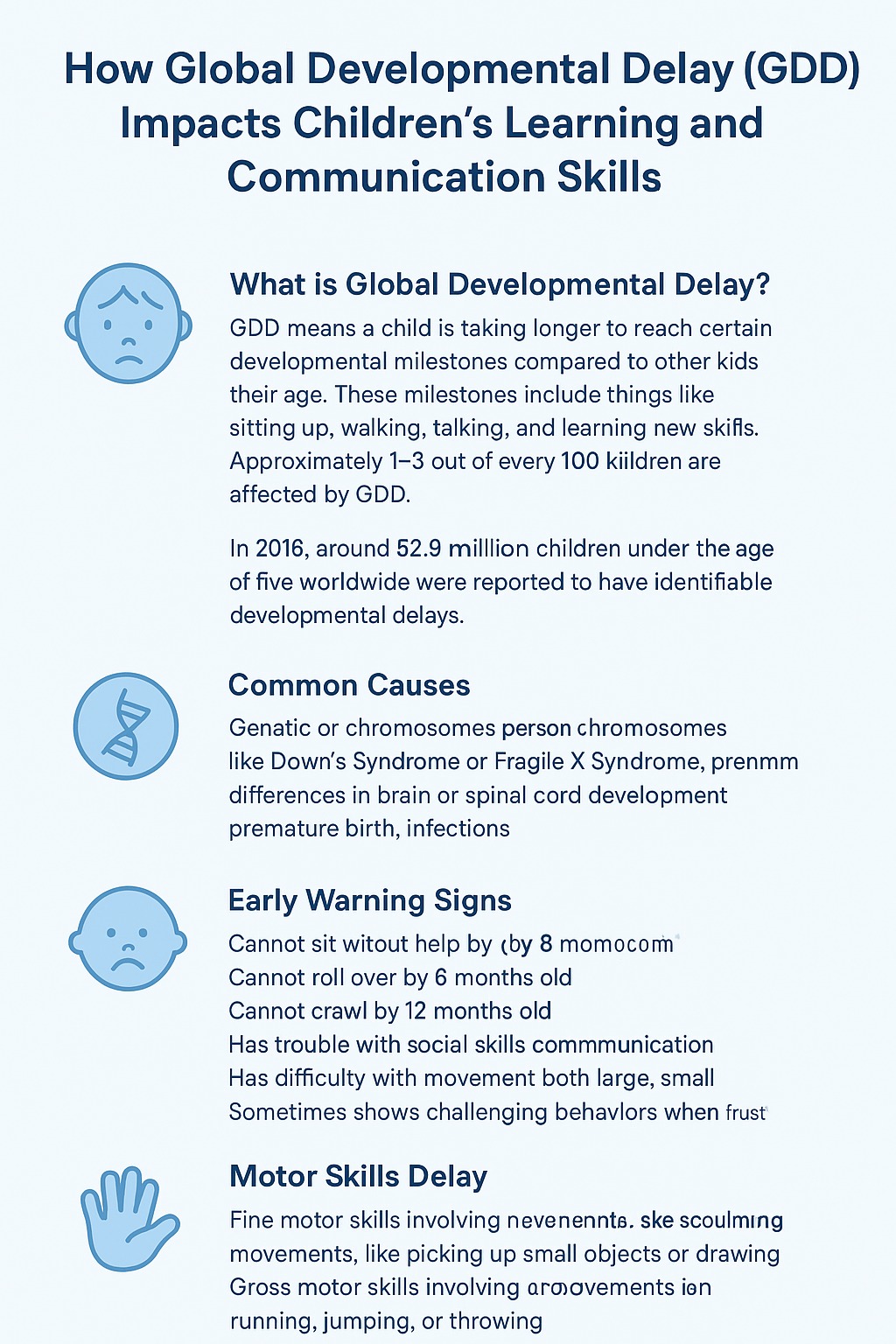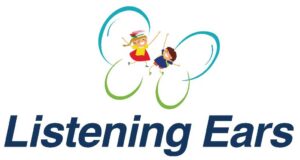
What is Global Developmental Delay?
Global Developmental Delay (GDD) means that a child is taking longer to reach certain development milestones compared to other kids their age. These milestones include things like sitting up, walking, talking, and learning new skills. About 1-3 out of every 100 kids have GDD.
Approximately 1–3 out of every 100 children are affected by GDD. In 2016, around 52.9 million children under the age of five worldwide were reported to have identifiable developmental delays
What Causes Global Developmental Delay in Children and How to Help Them
There are many different reasons why a child might have GDD:
- Sometimes it’s because of differences in genes or chromosomes (the tiny parts in our cells that tell our bodies how to grow), like Down’s Syndrome or Fragile X Syndrome
- Sometimes it’s because of how the brain or spinal cord developed
- Being born too early (premature birth)
- Infections like Meningitis
Doctors can do tests to try to find out why a child has GDD. Sometimes they can treat the cause, but often they can’t find exactly what caused it.

How to Spot the Signs of Global Developmental Delay in Your Child
You might notice a child with GDD:
- Can’t sit without help by 8 months old
- Can’t roll over by 6 months old
- Can’t crawl by 12 months old
- Has trouble with social skills
- Has trouble communicating
- Has difficulty with movement (either big movements like jumping or small movements like holding a crayon)
- Sometimes shows challenging behaviors when frustrated
Some babies show signs of GDD right after they’re born. For other kids, it might not be noticed until they start school.
What is a delay in motor skills?
Motor skills are the movements we make with our bodies:
- Fine motor skills are small movements, like picking up small objects or drawing
- Gross motor skills are big movements, like running, jumping, or throwing a ball
Typical milestones include lifting the head by 3 months, sitting with support by 6 months, and walking before age 2. By age 5, most children can stand on one foot and use utensils independently.
If a child struggles significantly with these skills, Occupational Therapy in Noida or Occupational Therapy in Delhi can help improve balance, coordination, daily living skills, and confidence through structured and play-based approaches.
All children develop at different speeds, but most babies can:
- Lift their head by 3 months old
- Sit with some support by 6 months old
- Walk before they turn 2 years old
By age 5, most kids can stand on one foot for 10 seconds and use a fork and spoon.
If your child is much slower at developing these skills, they might have a motor skill delay.
Global Developmental Delay (GDD) in Children: Understanding and Support Guide
| Category | Details |
| What is Global Developmental Delay? | A condition where children take longer to reach developmental milestones like sitting, walking, talking, and learning new skills compared to peers. Affects 1-3 out of every 100 children |
| Common Causes | Genetic or chromosomal differences like Down Syndrome or Fragile X Syndrome, differences in brain or spinal cord development, premature birth, infections like Meningitis. Sometimes the exact cause cannot be identified despite testing |
| Early Warning Signs | Cannot sit without help by 8 months, cannot roll over by 6 months, cannot crawl by 12 months, trouble with social skills and communication, difficulty with movement both large and small, challenging behaviors when frustrated. Signs may appear at birth or not until school age |
| Motor Skills Delay | Fine motor skills involve small movements like picking up objects or drawing. Gross motor skills involve large movements like running, jumping, throwing. Typical milestones include lifting head by 3 months, sitting with support by 6 months, walking before age 2, standing on one foot for 10 seconds by age 5 |
| Speech and Language Delay | Speech delay means fewer words than expected for age. Language delay involves trouble understanding others or expressing thoughts. Typical milestones include recognizing language sounds by 6 months, saying 2-3 words by 12-15 months, several words by 18 months, short sentences by 3 years. Hearing problems may contribute to delays |
| What Parents Should Do | Talk to doctor if concerned about development, seek early evaluation and diagnosis, request hearing tests to rule out hearing issues, be aware that all children develop at different speeds but delays need professional assessment |
| Available Support Services | Physical therapy for movement development, speech therapy for communication skills, behavioral therapy for learning and social skills, special education programs at school. Early intervention leads to better outcomes. Children can learn and grow at their own pace with proper support |
What is a delay in speech and language?
The first three years of life are super important for learning to talk:
- By 6 months, babies usually recognize basic language sounds
- By 12-15 months, most can say 2-3 simple words
- By 18 months, toddlers can usually say several words
- By 3 years old, most children speak in short sentences
Speech delay means a child isn’t saying as many words as expected for their age.
Language delay means a child has trouble understanding what others say or expressing their own thoughts.
Sometimes hearing problems can cause speech and language delays, so doctors will check a child’s hearing too.
Parents can play a big role in supporting children with hearing impairments as this can also impact speech and language development.
Steps to Take If Your Child Shows Signs of Developmental Delay
All kids grow and learn at different speeds. But if you’re worried about your child’s development, talk to your doctor. They can help figure out if there’s a delay and what might be causing it.
If your school-age child has a developmental delay, they might be able to get special help at school. This could include:
- Physical therapy to help with movement
- Speech therapy to help with talking
- Behavioral therapy to help with learning and social skills
- Special education programs
The earlier a child gets help, the better! With the right support, children with developmental delays can learn and grow in their own way and at their own pace.
Encouraging Early Growth
Listening Ears – Oishi Care recently organized a 3-Day Awareness Program on Mental Health in collaboration with DIET Karkardooma and SCERT, supported by Manodarpan Cell NCERT. During the event, Ms. Bakul Chaudhary, RCI-licensed Rehabilitation Psychologist, spoke about childhood mental health and developmental challenges. The discussions highlighted how early identification of developmental delays — like GDD — can lead to more effective interventions and improved emotional well-being in children.
Guided by Compassion and Science
At Listening Ears, Ms. Bakul Chaudhary and her multidisciplinary team emphasize understanding every child’s pace of growth rather than comparing milestones. Their holistic therapy approach combines emotional, behavioral, and communication support — ensuring children with Global Developmental Delay gain confidence and independence step by step.
Bottom Line:
Every child learns and grows in their own special way. Some kids may take a little longer to walk, talk, or learn new things — and that’s okay! With love, care, and the right help, they can keep getting better every day.
At Listening Ears, we support children who need a little extra help in learning and communicating. Our team works with families to make sure every child feels confident, happy, and ready to shine in their own unique way
FAQ's
What is Global Developmental Delay (GDD)?
It means some kids learn things a little slower than other kids their age, like walking, talking, or learning new skills.
Why do some kids have GDD?
It can happen because of how their brain or body grows, being born early, some illnesses, or changes in their genes.
How can I tell if a kid has GDD?
Some signs are: trouble sitting, crawling, talking, moving, making friends, or doing everyday activities like eating, playing, or getting dressed.
What are motor skills?
Motor skills are the things your body does:
- Big movements like running, jumping, or climbing.
- Small movements like picking up toys, holding a crayon, or buttoning clothes.
What is a speech or language delay?
The sooner a kid gets help, the easier it is to learn new skills, build confidence, and have fun with friends every day.
Can kids with GDD get help?
Yes! They can get help from doctors, speech therapists, physical therapists, teachers, and special programs at school.
Why is it important to get help early?
The sooner a kid gets help, the easier it is to learn new skills, build confidence, and have fun with friends every day.
Can kids with GDD grow and learn like other kids?
Yes! With support, they can learn, play, and do many things at their own pace. Every kid is special and can succeed.
